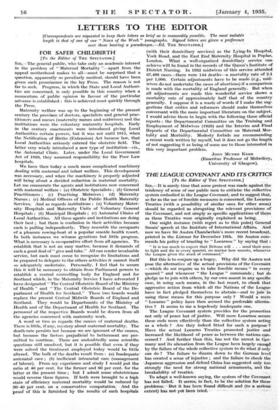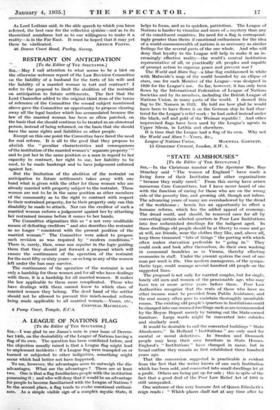THE LEAGUE COVENANT AND ITS CRITICS [To the Editor of
THE SPECTATOR.] Snt,—It is surely time that some protest was made against the tendency of some of our public men to criticize the collective system embodied in the League Covenant, and to suggest that, so far as the use of forcible measures is concerned, the Locarno Treaties (with a possibility of similarones, for other areas) should be regarded as abrogating the relevant provisions .of the Covenant, and not simply as specific applications of them
as these Treaties were originally explained as being. • -
One might instance (with regret as to this point) General Smuts' speech at the Institute of International Affairs. And now we have Sir Austen Chamberlain's more recent broadcait, printed in the Listener for December 19th. Sir Austen coin- mends his policy of trusting to " Locarnos " by saying thitt : " It is too much to expect that Britons will . . . send'their sons to fight and die in every quarrel, no matter how remote, whenever the League gives the word of command." - But this is to conjure up a bogey. Why did Sir Austen not pose the alternative of the actual provisions of the Covenant —which do not require us to take forcible means " in every quarrel " and whenever " the League " commands ; but do pledge us to join with others, by our own assent in any specific case, in using such means, in the last resort, to chegk that aggressive action from which all the Nations of the League have in fact pledged themselves to abstain—and to join• in using these means for this purpose only ? Would a; Mere " Locarno " policy have then seemed the preferable alterna- tive ? It seems to me a hopelessly inadequate one.
The League Covenant system provides for the promotion not only of peace but of justice. Will mere Locarnos secure these ends more effectively than the collective- system acting as a whole ? Are they indeed fitted for such a purpose ? Have the actual Locarno Treaties promoted justice and increased the likelihood of peace as between the nations con- cerned ? And further than this, has not the unrest in Ger- many and its alienation from the League been largely caused by the failure of the whole collective system to do what it only can do ? The failure to disarm down to the German level has created a sense of injustice ; and the failure to check the Japanese aggression and defend China has suggested only too, strongly the need for strong national armaments, and the breakability of treaties.
To adapt a well-known saying, the system of the Covenant has not failed. It seems, in fact, to be the solution for these problems. But it has been found difficult and (to a serious extent) has not yet been tried. -
As Lord Lothian said, in the able speech to which you have referred, the best case for the callective Syste'innot'aS to its theoretical soundness but as to our willingness to make it a reality—is in the Far East. It must be hoped that it may-yet there be vindicated. ARTHUR FLOYD: 46 Downs Court Road, Purley, Surrey.







































 Previous page
Previous page